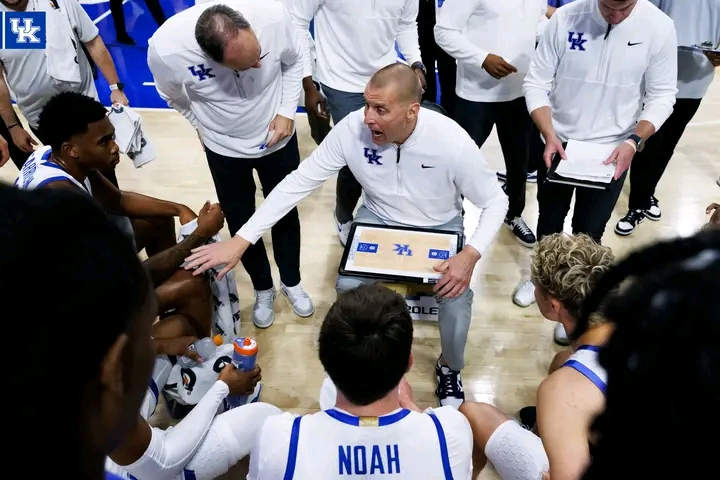When Kentucky scheduled an exhibition matchup with Purdue, most saw it as a chance to test Mark Pope’s new system against one of college basketball’s toughest frontcourts. Purdue entered with size, experience, and confidence — but what unfolded was a tactical clinic from Pope’s Wildcats. Kentucky didn’t just survive against the Boilermakers — they controlled the game from start to finish.
The starting five — Otega Oweh, Denzel Aberdeen, Trent Noah, Mouhamed Dioubate, and Brandon Garrison — set the tone early with energy and physicality. Pope’s message was clear: attack, move, and make Purdue uncomfortable. And that’s exactly what they did.
Purdue’s 7-foot-4 center Zach Edey was swarmed every time he touched the ball. Kentucky’s defensive game plan revolved around quick doubles from Oweh and Dioubate, forcing Edey to give up the ball before he could get into rhythm. The rotations behind them were flawless — Aberdeen and Noah closed out on shooters, while Garrison anchored the paint with a presence that gave Kentucky early control.
Mark Pope’s tactics were as modern as they were fearless. Instead of trying to outmuscle Purdue in the post, he spaced the floor, pushed tempo, and relied on ball movement to pull Purdue’s bigs away from the basket. It was the kind of game plan that rewarded discipline — and Kentucky executed it perfectly.
That’s when Jasper Johnson stole the show.
Coming off the bench, Johnson injected life into Kentucky’s offense with his smooth shooting, quick first step, and veteran-level poise. Every time Purdue looked ready to swing momentum, the freshman guard answered — with a clutch jumper, a transition assist, or a confident drive through traffic. He didn’t just blend in; he took over key stretches.
“That’s who Jasper is,” Pope said after the game. “He sees the floor, he plays with no fear, and he trusts his preparation. That’s rare for a freshman.”
Collin Chandler was the first substitution, checking in early in the first half, and immediately made an impact with smart ball handling and spacing. His chemistry with Johnson and Aberdeen in the backcourt gave Kentucky a steady rhythm on both ends. Malachi Moreno also provided valuable minutes off the bench, using his length to contest shots and rebound against Purdue’s size.
Meanwhile, Otega Oweh reminded everyone why fans missed him when he was injured last season. His defensive intensity, transition scoring, and leadership were everywhere. Oweh turned deflections into fast breaks and played with a spark that lifted the entire team. Denzel Aberdeen’s aggressive drives kept pressure on Purdue’s defense, while Trent Noah continued to stretch the floor with his smooth outside shooting.
Mouhamed Dioubate brought the grit and hustle, battling Purdue’s frontcourt on every possession, and Brandon Garrison provided a steady presence inside — altering shots, setting strong screens, and running the floor like a guard.
What makes the performance even more impressive is who didn’t play.
Jaland Lowe was out with a shoulder injury, Jayden Quaintance missed the game due to injury, and Reece Potter was sidelined with an illness. Despite those absences, Kentucky looked deep, balanced, and locked in — a testament to Pope’s system and preparation.
By the second half, it was clear: Pope’s Wildcats weren’t just playing well — they were playing smarter. Their ability to switch defensive looks, push tempo, and execute spacing principles turned Purdue’s biggest advantage — its size — into a weakness.
Every substitution fit seamlessly. Every defensive rotation had purpose. Every possession told a story of a team that was playing connected basketball.
Pope’s postgame comments summed it up best:
“It’s not about being perfect — it’s about playing for each other. When you do that, tactics work, the system works, and everyone looks good.”
This wasn’t just an exhibition win. It was a proof of concept for the new Kentucky era — one defined by adaptability, chemistry, and a coach who understands how to get the best out of every piece on the board.
With Jasper Johnson emerging as one of the early standouts, and veterans like Oweh, Aberdeen, and Noah setting the tone, the message is clear: this team isn’t waiting to grow into its identity — it’s already forming one.
If Mark Pope can make this kind of statement in October, imagine what March might look like.
Because on a night when Kentucky was supposed to be tested, they turned the tables — and Mark Pope passed with tactical brilliance.

